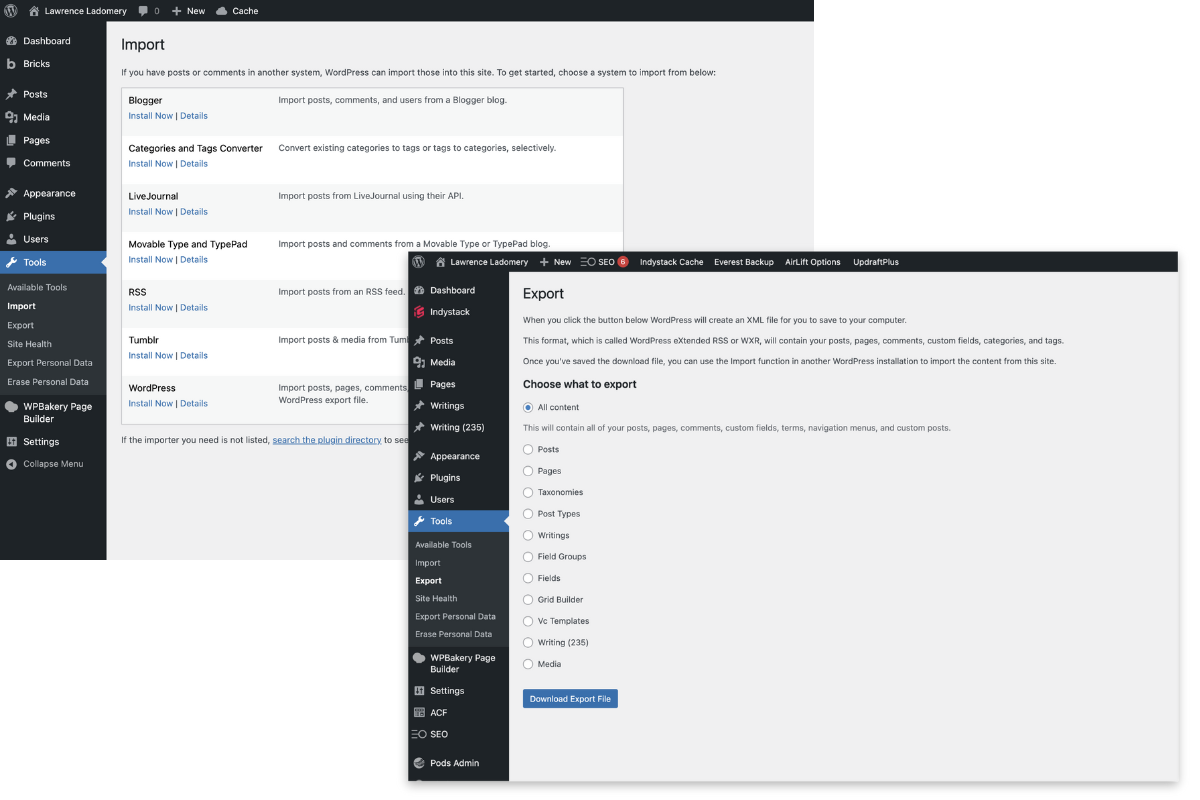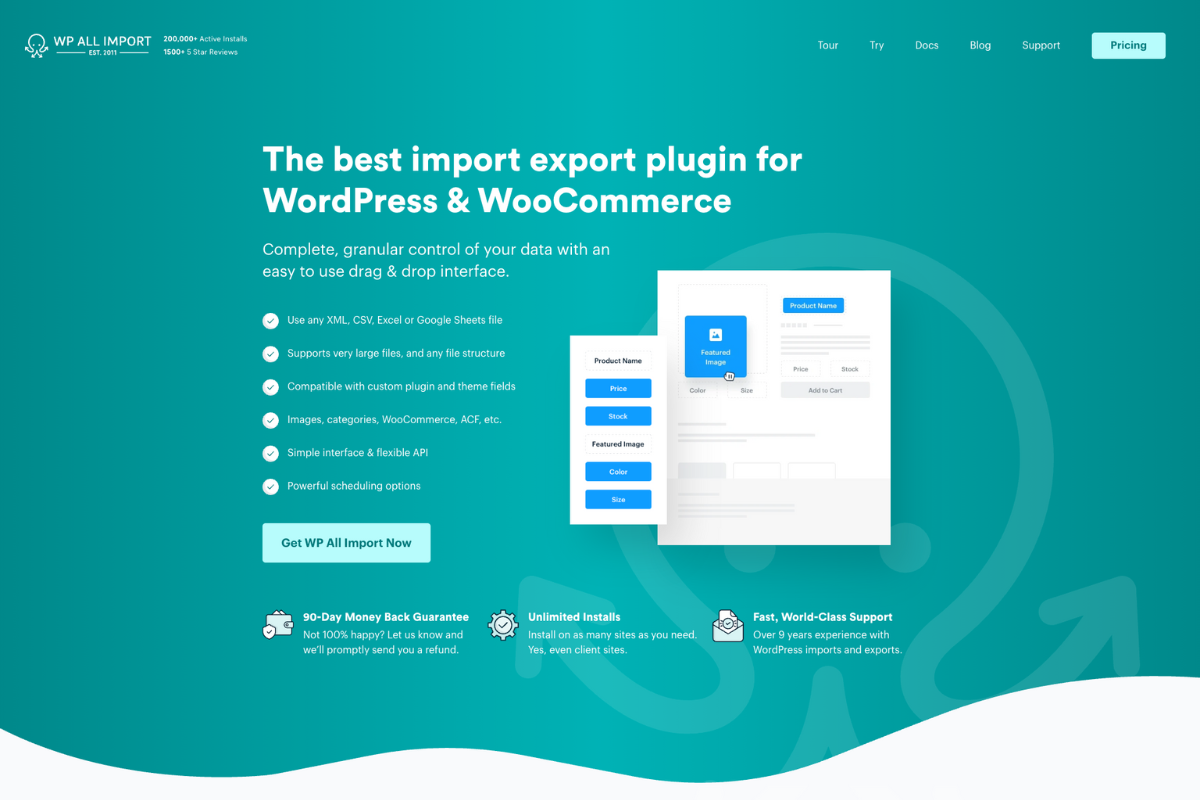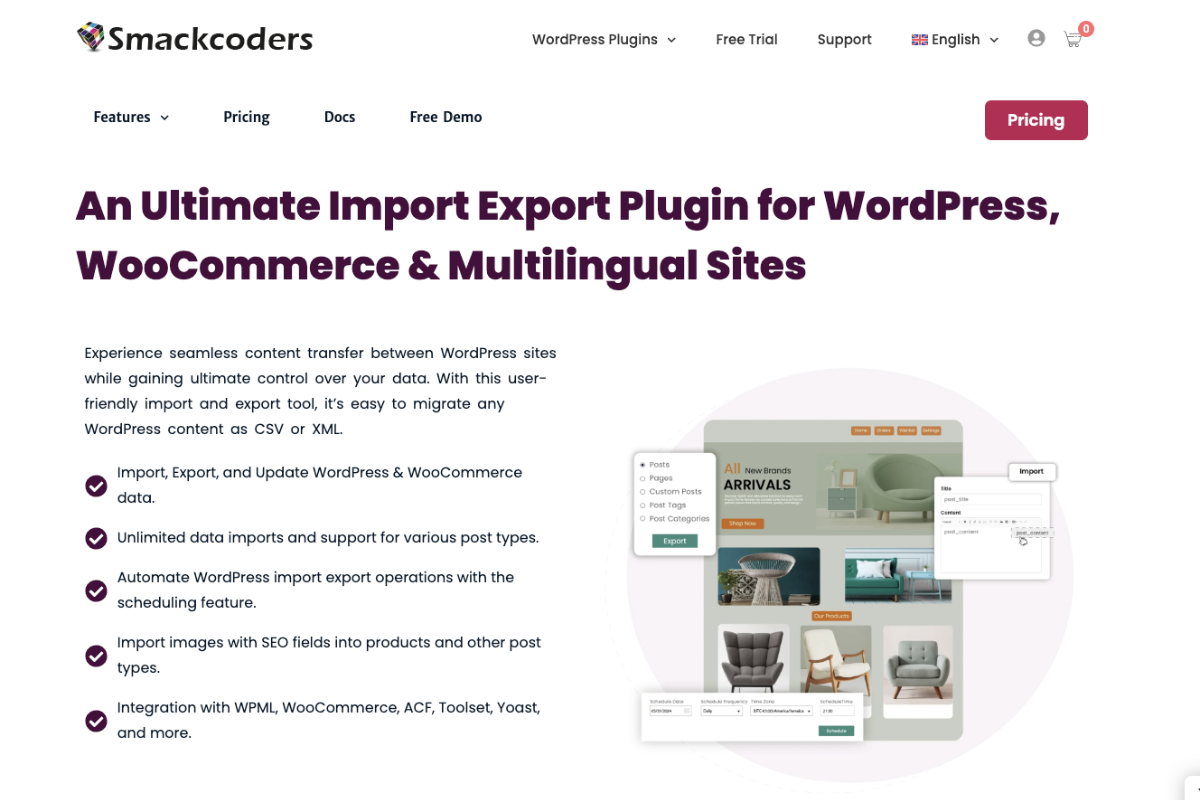The Best Plugins To Import and Export WordPress Data
Importing and exporting data in WordPress is something I deal with a lot – it’s a key part of managing any site. Whether I’m moving a site to a new host, syncing content between different environments, or pulling in a ton of data from another CMS, being able to move data in and out of WordPress smoothly is absolutely essential.
It becomes even more important when I’m working with complex setups involving custom post types, taxonomies, and extra metadata – doing all that by hand would be way too slow and error-prone.
This stuff is especially crucial for eCommerce, like if I’m running a WooCommerce store. I often need to import updated product info, keep inventory synced, or hook things up with external systems like an ERP or CRM. Having the right tools for that makes life way easier. And when I can automate these processes? Total time-saver and way less risk of human error.
That said, it still needs to be done carefully – a tiny mistake in a CSV column or a wrong field mapping can mess things up, from broken layouts to duplicated content or even taking the site down. That’s why picking a solid plugin and sticking to best practices is so important.
For context, I wrote this blog post after searching for a plugin to export SEO meta data to update it in bulk in a spreadsheet, and then import it back into WordPress. I’ll let you know at the end of the post which plugin I used.
Here are the ones I looked at, starting with the basics: WordPress’ own built-in import/export tool.
WordPress Native Import/Export Tools

Plugin URL: Built into WordPress core (no installation required)
WordPress includes built-in import and export tools accessible via the dashboard under Tools; the Import and Export options.
The export tool allows you to download your site’s content as an XML file, encompassing posts, pages, comments, custom fields, categories, and tags. The import tool facilitates the uploading of this XML file into another WordPress site, enabling straightforward content migration.
These tools are ideal for basic content transfers between WordPress sites, especially when dealing with standard post types and taxonomies. However, they have limitations, particularly when handling custom post types, complex metadata, or large datasets. For more advanced import/export needs, third-party plugins offer enhanced functionality.
Pros:
- No additional plugins required; built into WordPress
- Simple and straightforward for basic content transfers
- Suitable for small to medium-sized sites
Cons:
- Limited to XML format
- Does not support custom post types or custom fields effectively
- Lacks scheduling and automation features
Pricing: Free (included with WordPress)
2WP All Import

Plugin URL: https://wordpress.org/plugins/wp-all-import/
Website: https://www.wpallimport.com
WP All Import is a powerful plugin designed to import data from XML, CSV, Excel, or Google Sheets into WordPress. It features a user-friendly drag-and-drop interface, allowing users to map data fields easily. The plugin supports importing various content types, including posts, pages, custom post types, users, and WooCommerce products. Advanced features like scheduling, custom field mapping, and support for large datasets make it suitable for complex import tasks.
The plugin can also export data, in multiple formats and allowing a degree of data manipulation as part of the workflow, including rearranging and renaming columns, and filters to export segments of the data.
Pros:
- Supports multiple file formats (XML, CSV, Excel)
- Drag-and-drop interface for easy field mapping
- Handles large datasets efficiently
- Powerful export function
Cons:
- Initial setup may be complex for beginners
- The cheaper Pro option doesn’t include export functionality
Pricing: Pro version starts at $99/year
Free Version Available: Yes
WP Import Export Lite

Plugin URL: https://wordpress.org/plugins/wp-import-export-lite/
Website: https://plugins.vjinfotech.com/wordpress-import-export/
WP Import Export Lite is a user-friendly plugin that facilitates the import and export of WordPress data. We’re including it in this list as the free version available in the WordPress Plugin Directory includes many features that other plugins bundle with their paid versions.
WP Import Export Lite supports various content types, including posts, pages, custom post types, taxonomies, comments, and users. The plugin allows data export and import in multiple file formats, such as CSV, XLS, XLSX, JSON, TXT, ODS, XML, and ZIP.
Key features include drag-and-drop field mapping, background processing, pause and resume capabilities, and powerful filters for data selection. While the free version offers substantial functionality, the premium version adds features like scheduled imports/exports and support for additional plugins through 19+ freemium add-ons.
Pros:
- Supports a wide range of file formats
- Drag-and-drop field mapping simplifies data handling
- Background processing with pause and resume options
- Extensive filtering options for precise data selection
Cons:
- Some advanced features require the premium version
- User interface may be less intuitive for beginners
Pricing: Premium version starts at $69/year
Free Version Available: Yes
WP Ultimate CSV Importer Pro

Plugin URL: https://wordpress.org/plugins/wp-ultimate-csv-importer/
Website: https://www.smackcoders.com/wp-ultimate-csv-importer-pro.html
WP Ultimate CSV Importer Pro is a powerful plugin from Smackcoders that enables import/export of WordPress content using CSV, XML, or Excel files. It supports a wide range of data types like posts, pages, users, custom post types, comments, and WooCommerce products. Its drag-and-drop interface makes field mapping easy and accurate.
The plugin integrates with popular tools such as ACF, WPML, Polylang, and SEO plugins like Yoast and Rank Math. It allows data imports from local files, URLs, FTP, and cloud services. Advanced features include scheduled tasks, media import support, rollback, maintenance mode, and detailed logs for troubleshooting.
This plugin is ideal for developers, e-commerce stores, and agencies needing efficient and large-scale data handling within WordPress.
Pros:
- Supports multiple file formats: CSV, XML, and Excel
- Drag-and-drop field mapping for ease of use
- Scheduled imports and exports for automation
- Compatible with popular plugins like ACF, WPML, Polylang, Yoast SEO, and Rank Math
- Robust media handling, including image imports with metadata
- Rollback and maintenance mode features for safe im
- Conditional imports and advanced filters
- Detailed import logs for error tracking and debugging
Cons:
- Advanced features are available only in the Pro version
- Initial setup may be complex for beginners
- Some users have reported the need for manual updates in the Pro version
Pricing: One-time payment starting at $149, with lifetime support and updates included
Free Version Available: Yes
Do You Need To Import/Export WPBakery Templates?
For this use case you need the Templatera add on, which includes an import and export tool.
If you don’t know what Templatera is, it lets you create, store, and reuse custom page layouts across different parts of a site. What’s especially handy is the ability to import and export those templates, which comes in really useful when moving designs between environments or reusing layouts across multiple websites.
To export templates, just head to the Templates section in the WordPress admin (under Templatera) and use the bulk actions to export selected templates as a .json file. Then, on another site, you can import them through the same Templates screen by uploading that file. Once imported, all the layouts are ready to go- no need to rebuild anything from scratch. This workflow saves a lot of time, especially when working on client sites that share a common design system or when staging and production environments need to stay in sync.
Final Thoughts
To wrap it up, picking the right WordPress import/export plugin really comes down to how complex your data is and what you need to accomplish. WordPress’ built-in tools are fine for simple jobs, but they tend to fall short when you’re dealing with custom post types, metadata, or large volumes of data.
For more advanced scenarios, I’ve found plugins like WP All Import, WP Import Export Lite, and WP Ultimate CSV Importer to be much more capable. They offer features like custom field mapping, support for WooCommerce, and the ability to schedule imports- things that make a big difference when working with dynamic or complex sites.
Each of these tools brings something different to the table. WP All Import is great if you want a user-friendly interface and flexibility with different file formats. WP Import Export Lite has a strong free version and makes it easy to upgrade if you need more features. And WP Ultimate CSV Importer Pro is ideal when you’re working with more complex data or need integrations with other plugins.
For the record, I ended up using WP Ultimate CSV Importer Pro, which is both powerful and easy to use. It works very well with SEO Press, the SEO plugin I’m using for this project.
Whatever tool you go with, the most important thing is to plan ahead and make sure your data is clean. That goes a long way toward preventing issues and keeping your migration or sync process running smoothly.